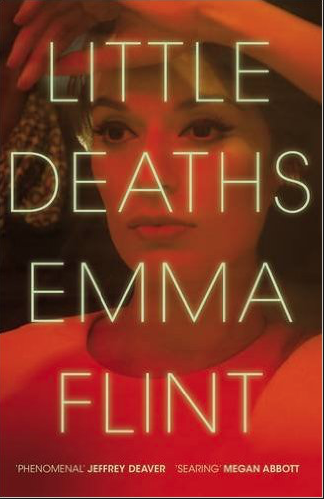
Emma Flint’s debut novel Little Deaths is among the novels on the Baileys Prize Long List 2017. The Baileys list is one of only a few prize lists I’m interested in. Usually I read three to four of the novels on the list. I hadn’t heard of Emma Flint’s book before seeing the list and it immediately caught my attention.
Set in 1965, in New York, it tells the story of Ruth Malone whose two children, Cindy and Frankie, disappear and are found dead a few days later. The book begins with Ruth’s voice. She’s in prison, thinking back. This is the only part written in present tense, from then on the book stays in past tense and is told by Ruth and Peter Wonicke, a journalist.
We know from the beginning that Ruth is found guilty of the murder of her children but we will only find out at the end how that happend and whether she did it. In a way it’s not even that important because this book isn’t as much about whether Ruth is guilty or not as it is about the vilification of women.
Ruth Malone is glamorous. She loves to dress up, uses make-up, is separated from her husband, has affairs and lovers. She dresses provocatively, loves sex, and drinks too much. Not the way the other women in the neighbourhood behave. Definitely not the way the policemen’s wives behave. Everybody seems to have an idea of how a woman and especially a wife and mother has to be and that definitely hasn’t anything to do with the way Ruth conducts herself.
What follows is less an inquiry than a witch hunt. A witch hunt that leads to a trial. People – the neighbours, the police, the press – want Ruth to be found guilty. They want her punished for her life style and would do anything to break her and see her in prison.
I guess it’s easy to understand that this was an upsetting book. Two children are dead but what people really seem to be interested in is seeing their mother behind bars, just because she’s different. It made me think of the last book I reviewed here, Asking For It. While the two books are very different, they have one thing in common – women are punished for their behavior.
I think it was a good idea to tell large parts of the story from the point of view of a journalist. Like everyone else, Wonicke wants Ruth to be guilty at first because that would make a great story. He writes a few short pieces about her and they all make her look suspicious. Why would a mother whose children have disappeared bother to dress up and put on make up? Why would she buy a new dress after finding out her kids were murdered? And since sex sells, Wonicke emphasises that she’s very attractive. Ultimately though, Wonicke is a good guy and after a while he realizes that he doesn’t help finding the culprit. On the contrary, he helps clouding people’s judgment and enforces their belief in Ruth’s guilt.
By the time he realises what he’s done, it’s already too late. Not because of his articles but because the police and the neighbours have seen to many things they consider suspicious and because Ruth is withdrawn and haughty. People expect her to be broken, to stay in, but she goes out, drinks, and has sex like before.
Wonicke falls for her and swears he will help her find the perpetrator. Thanks to his sympathetic look, the reader interprets Ruth differently.
He felt like he was seeing her in a different light today. However this played out—whether Devlin made an arrest or not, whether they got a conviction or not—how could this ever end for her? Surely she’d never be the same woman again. She’d never be able to sit in the sun for the sheer pleasure of it, or walk into a store and pick out a dress just because it was pretty. No one would ever be able to look at her and not remember.
Ruth’s story is inspired by a true crime – the Alice Crimmins case. I didn’t know that when I bought the book. I found out when I started reading because Emma Flint mentions in the bio section that she’s always loved true crime. I then skimmed the acknowledgement section where she mentions which case inspired her. I’m not so keen on books inspired by true crimes because I can’t stop wondering how much is really true.
While it’s not a depressing book, it’s extremely upsetting. To think that something like this happened. For some reasons it made me think of the poet Anne Sexton. Ruth stands for all of those women, like Anne Sexton, who didn’t have a lot of choices. Who got married and had kids and felt trapped. It’s never said but Ruth’s behavior lets us assume that there’s at least a masked depression underneath it all.
I liked this book a lot. I wish I hadn’t read it so quickly because it has many amazing passages. The writing is so strong. It’s definitely more literary than crime. The focus is on the way Ruth is hunted, not so much on whether or not she did it. Highly recommended.
